- Home
- Henry James
Letters from the Palazzo Barbaro Page 6
Letters from the Palazzo Barbaro Read online
Page 6
9. Robert Browning, who died in Venice in 1889. His son “Pen”, married a rich American, Fannie Coddington, bought the huge Palazzo Rezzonico in 1889. His previous arrangements made with Count Montecuccoli (“the vendor”) to buy from him the Palazzo Contarini dal Zaffo failed.
10. Mr. Peabody Russell bought both Palazzo Contarini Corfù and Palazzo Contarini dagli Scrigni, on the Grand Canal.
11. Sir Henry Layard (1817–1894), the diplomat and discoverer of Niniveh, lived with his wife Enid in Palazzo Cappello, on the Grand Canal, between Rialto and the Academy. Also Prince Paul Metternich (1834–1906), with his wife Mélanie, lived in Venice, and so did Don Carlos of Bourbon (1848–1909), from 1876. Don Carlos, duke of Madrid and the pretender to the throne of Spain, lived in Palazzo Loredan, at San Vio. The Mocenigos were an ancient patrician family of Venice.
IV
To Sarah Butler Wister1
February 27th [1887]
(Edel III)
Venice, Palazzino Alvisi
Canal Grande
Dear Mrs. Wister.
It would be a history to tell you why I have waited till this hour—and till I should be in this place—to answer your valued letter of so many weeks ago. To put that history in three words—I have been, from the moment it came—or from a certain time afterward—been expecting, from one week to the other, to go to Rome, and I wanted to give myself—and you!—the satisfaction (in the hour I should spend with you) of the Roman medium. Never, never have I forgotten how some of the most ineffaceable impressions of my life were gathered there fifteen years ago, in your society. But month has followed month—and I haven’t yet gone to Rome—and, strange as it may appear to you, it seems a little doubtful that I shall manage it. Therefore you must have your letter now and here. I came to Italy on December 1st; and have spent in Florence the whole time that has elapsed since then—until five days ago. My winter has taken a different turn from my first plan.—I am staying abroad twice as long, and dividing my time between Florence and Venice. I was to have gone to Rome on February 1st—but it proved just the thing, when the moment came, that I didn’t want to do—owing to the shoals of people with whom my visit would have been associated. I came abroad to escape ’em (the human race—excuse my fastidiousness!) but I found myself much mixed up with them in Florence—so that it was more difficult than I had hoped to get time for reading (for which there is horribly little time in London—so that I depend on my foreign excursions to make it up) and generally possessing my soul. But behold, every one I had ever heard of, and I didn’t want to hear of again, was ascertained by me to be either in Rome or on the way there—so that I foresaw the shipwreck of all my hopes of concentration. I foresaw that inevitably my life would intertwine with a thousand irrelevancies. In a word, it was plain that I wouldn’t be unknowing and unknown (excuse my fatuity!) so that I put it off. This was the easier to do as one’s stomach is really turned here by the accounts of the hideous things that are being wrought upon the helpless seven hills. Destruction and vulgarization everywhere—and the Villa Ludovisi cut up into building lots. The Villa Ludovisi—-je ne vous dis que cela! I staid in Florence till February 22nd and then came here for an indefinite number of weeks. I find it delightfully quiet—though I am staying—for the moment—with the good Mrs. Bronson. She has a little apartment—a sort of detached wing or pavilion, in the rear of her house—which she kindly puts at the disposition of her friends.
I occupy it—in pursuance of a frequent promise—for the present, but shall seek an independent lodging as soon as I civilly may. Venice is wintry yet and so little terne, in consequence; also the calles and campos impress the sense with a kind of glutinous, malodorous damp. But it is Venice, none the less, and it is a ravishment to be here and to think that every week, at this season, will bring out a little more of the colour. I have a hope, if I stay in Italy late enough, of going down to Rome for ten days in May—when the damaging crowd shall have taken itself off. I dream then of also taking a little tour of old towns in Tuscany. If I am able to do this I shall certainly give you news of Rome […]
February 28th. I had to break off my letter yesterday, and since then we have been a good deal flurried by further personal accounts of the wretched contagious scare produced on the Riviera by the recent earthquake-shocks, of which the full report will have come to you in the U.S.—that is, I saw last evening the Daniel Curtises,2 of Boston (she, you may remember, a sister of that melancholy and strenuous, but estimable and superior, Miss Wormeley3 of Newport, who has lately been so incongruously—as a New England old-maid, unacquainted with French—and other badnesses—mistranslating Balzac); which D. Curtises have just fled back from the frightened though not hurt Monte Carlo—to the splendid Palazzo Barbaro, of which they are the enviable owners (they have bought it) here. The Riviera has been full of people we know—and many, no doubt (lots of Bostonians) known to you; and the sudden violent, alarmed break-up and stampede of the luxurious colony (though unaccompanied by any real injury—except to the poor people who live by its presence there)—have been really melancholy and sickening. I hear of Mrs. Mason and her Balfours, passing their nights in a carriage at Monte Carlo—where they have had a villa.
March 1st. I was again interrupted—yesterday—but this time I vow I shall have my talk with you out. The day is lovely—and the golden glow of Venice streams into my room. On laying down my pen yesterday I went out and in the course of the afternoon paid a visit to a most remarkable woman—the Countess Pisani4—a lady who vaguely suggests Caterina Cornaro and makes one believe in the romantic heroines of D’Israeli and Bulwer.5 She has English blood in her veins—her father was the doctor who bled Byron to death at Missolonghi—and her mother a French odalisque out of the harem of the Grand Turk. The late Count Pisani married her thirty-five years ago for her beauty which must have been extraordinary and still is very striking (she is fifty-five and looks about forty); she has spent all her life in Italy; and today widowed, childless, palaced, villaed, pictured, jewelled, and modified by Venetian society in a kind of mysterious awe—she passes for a great personage and the biggest swell—on the whole—in the place. She is very little in Venice—living mainly at her villa on the mainland, where she farms a large property with un-Venetian energy. She made an impression—on me—as of one not formed of the usual social stuff of today—but the sort of woman one might have found—receiving on a balcony, here—at 2 o’clock on a June morning—in the early years of the century […] I am ever your affectionate old friend
Henry James
NOTES
1. Sarah Butler Wister (1835–1908), the daughter of the famous actress Fanny Kemble.
2. Daniel Sargent Curtis (1825–1908) and his wife Ariana Wormeley Curtis (1833–1922) had established themselves in Venice, becoming the owners of Palazzo Barbaro in 1885. They had two children, Osborne (1858–1918) and Ralph (1854–1922), the latter a painter and a friend of Sargent, whose cousin he was on his mother’s side.
3. Katherine Prescott Wormeley (1830–1908), the sister of Ariana Wormeley Curtis and the translator of Balzac, Bourget, Dumas, St. Beuve.
4. Evelin van Millingen (1830–1902) married the last of the Pisani of Santo Stefano, Almorò. Her mother, a French woman, had not come “out of the harem of the grand Turk”, but, having lived in Constantinople for thirty years, she had written an autobiographical volume, Thirty Years in a Harem, having had as her second husband the Turkish ambassador H. H. Kibrizli-Mehemet Pasha. Caterina Cornaro was Queen of Cyprus in the fifteenth century and on the death of her husband James II she left her reign to the Republic of Venice, retiring to Asolo where she held court. See F. Colasanti, Dizionario Biografico degli Italiani., vol. 22, Rome, 1979. Caterina Cornaro was quite a legendary figure in the XIX century. (Ariana Curtis’s cat was called Caterina Cornaro).
5. Benjamin Disraeli (1804–1881) and Bulwer-Lytton (1803–1873), at the time very well known as novelists.
V
To Francis Boott1
&n
bsp; March 15th [1887]
(Edel III)
Palazzino Alvisi
Canal Grande
My dear Francis.
I am much gratified by your letter, which renews the chain of intercourse. It comes to me on a dark dripping un-Venetian morning which is the third or fourth of a dismal series. Yesterday there were sinister carts in the Piazza and men who looked like Irishmen shovelling away snow. One was almost sorry to have left Boston. Can one indeed say one has, with Daniel Curtis, here, doing his best (though he abuses “over there” so much) to make the Grand Canal seem like Beacon Street,2 I see them pretty often and they are very friendly. But one calculates the time when one shall have worked through his anecdotes and come out the other side. Perhaps one never does—it is an unboreable—or unbearable—St. Gothard. I have gone several times to see Laura—Wagnière-Huntington—3 and Mabel—and find the latter indeed, as you say, made of heroic stuff; to the impression of which her Medea-beauty greatly adds. Her situation is terribly touching—and you can form no idea, until you have heard it from their own lips and also those of the Curtises, of the horrors of that combined tragedy of the earthquake and Henry H[untington]’s unmanageable madness. The helplessness of the two women (after the Curtises left them) and the details of the whole thing were too miserable […] The quiet of this place is comfortable to me after the lively bustle of Florence. There are tea-parties here but one doesn’t hear the clatter of the cups. I am accepting for the time the hospitality of this little palazzo Giustinian-Recanati in Mrs. Bronson’s rear; but I have my own ménage, and reserve, pretty well, my freedom. Your Florentine Mr. B[rowning] is here—for a week, but is dimmed by a cold. I think I can never have written “very pleased” except dramatically—in the mouth of someone speaking—è vero? It is, however, very possible that I may have written very possible in propria persona. Tell Fenimore I forgive her—but only an angel would. She will understand. Much love to Lizzie and tanti saluti to the two gentlemen. Ever yours faithfully
Henry James
NOTES
1. Francis Boott (1813–1904), the American musician and composer, with his daughter Lizzie (1846–1888), who married the painter Frank Duveneck (1848–1919) and died young, from 1848 lived in Italy, after the death of his wife and child. He went back to the U.S. after the death of Lizzie, in 1889.
2. The famous Boston Street.
3. Laura Huntington Wagnière, American, the niece of sculptor Horatio Greenough, married the Swiss-Italian banker Henry Wagnière (Edel, Letters III, p.226).
VI
To Mrs. Daniel S. Curtis
April 23rd [1887]
(Edel III)
Villa Bricchieri
Bellosguardo
Dear Mrs. Curtis.
I send you this by the hand of my valued friend M. Paul Bourget,1 who will already have been very considerably introduced to you. He goes to Venice for a month; I take the greatest interest in him, and I can give him no better proof of it than to put it in his power to know Mr. Curtis and you. You will also not consider that I have been moved by anything less than extreme sympathy in making you acquainted with so agreeable and distinguished a person. Please let him see the flicker of the canal on your gilded roof—and take him over to the garden and show him the garden-house. I envy him, at the mere thought! I hoped to have been in Venice during his stay—and then I should have brought him to you. But I shall assist in spirit at your causeries and bless your relations. Believe me, in advance, very gratefully yours, and Mr. Curtis’s—
Henry James
NOTE
1. Paul Bourget (1852–1935), the French writer, whose novel Cosmopolis portrays the cosmopolitan expatriate society of Italy.
VII
To Catherine Walsh1
June 16th [1887]
(Edel III)
Venice: (Palazzo Barbaro)
Dearest Aunt.
As usual, when I am just on the point of writing to you comes in a good letter from you: with the date of May 30th […] I am in Venice as you see—for the second time since I have come abroad. My stay, which will have been of a month this time, draws to a close—I depart on the 25th. It is piping hot but as beautiful as ever. I have been paying a long visit—long for me, who like less and less as I grow older, to stay with people, to the Daniel Curtises, formerly of Boston but who have been living here for years and are the owners of this magnificent old palace—all marble and frescoes and portraits of Doges—a delightful habitation for hot weather. Mrs. Curtis is a sister of Miss Wormeley of Newport, whom she much resembles in face—and she and her husband are very intelligent, clever and hospitable people. I came for ten days, and they have simply kept me on. Dick Walsh came to see me a couple of days ago—and yesterday I took him over to the Lido. He seems a very good and gentlemanly little fellow—but without much “culture” or general information—though fond of art and artists. Mrs. Curtis has invited him to a party here, tonight. He is much with the McClellans,2 the General’s widow, son and daughter—and very devoted to the latter, a rather flippant spoiled girl, who has got into a peck of trouble here by writing a strangely indiscreet and reprehensible letter to the New York World about Venetian “society,” which received her very well last winter. The strange things of that sort that the American female does!—as witness the terrible Mrs. Sherwood, poor “Posy” Emmet’s mother-in-law. She invited me (and some others) to dine with her in London last summer, and then wrote a fearful letter about it (I having gone, all unconscious) to the American journals, which she afterwards sent me as if I should be delighted to see it […] I will write again as soon as I get back to London, and am meanwhile ever your loving nevvy
Henry James
NOTES
1. Catherine Walsh (aunt Kate), the sister of Henry’s mother. She died in 1899.
2. The McClellans: General George B. McClellan’s (1826–1885) widow and children. He had been the General commanding northern forces during the Civil War, and was defeated by Abraham Lincoln in the 1864 presidential campaign.
VIII
To Thomas Bailey Aldrich1
June 21st [1887]
(Edel III)
Venice.
My dear Aldrich.
I send you today the remainder and end of “The Aspern Papers”—the Tale in two parts of which I sent you the First and a portion of the Second Part about ten days ago (on the 12th ult.). I wrote to you at some length about the story on that occasion—so that there is nothing now to add save the hope the accompanying may quickly and safely rejoin its predecessor. Ever yours
Henry James
NOTE
1. Thomas Bailey Aldrich (1836–1907), a writer and the director of the Atlantic Monthly from 1881 to 1890; he lived in Boston from 1865. In March-May 1888 he published The Aspern Papers in the journal (Edel, Letters III, p.186).
IX
To Grace Norton
July 23rd, 1887
(Edel III)
34 De Vere Gardens W.
My dear Grace.
I am ashamed to find myself back in England without having fulfilled the inward vow I took when I received your last good and generous letter—that of writing to you before my long stay on the continent was over. But I almost don’t fail of that vow—inasmuch as I returned only day before yesterday. My eight months’ escape into the happy immunities of foreign life is over and the stern realities of London surround me; in the shape of stuffy midsummer heat (that of this metropolis has a truly British ponderosity—it’s as dull as an article in a Quarterly), smoke, circulars, invitations, bills, the one sauce that Talleyrand commemorated, and reverberations of the grotesque Jubilee. On the other hand my small home seems most pleasant and peculiar (in the sense of being my own), and my servants are as punctual as they are prim—which is saying much. But I enjoyed my absence, and I shall endeavour to repeat it every year, for the future, on a smaller scale: that is, to leave London, not at the beginning of the winter but at the end, by the mid-April, and take the period of the insufferable
Season regularly in Italy. It was a great satisfaction to me to find that I am as fond of that dear country as I ever was—and that its infinite charm and interest are one of the things in life to be most relied upon. I was afraid that the dryness of age—which drains us of so many sentiments—had reduced my old tendresse to a mere memory. But no—it is really so much in my pocket, as it were, to feel that Italy is always there. It is rather rude, my dear Grace, to say all this to you—for whom it is there to so little purpose. But if I should observe this scruple about all the places that you don’t go to, or are not in, when I write to you, my writing would go very much on one leg. I was back again in Venice—where I paid a second visit late in the season (from the middle of May to July 1st)—when I got your last letter. I was staying at the Palazzo Barbaro, with the Daniel Curtises—the happy owners, today, of that magnificent house—a place of which the full charm only sinks into your spirit as you go on living there, seeing it in all its hours and phases. I went for ten days, and they clinging to me, I staid five weeks: the longest visit I ever paid a “private family.” The Curtises are very private—and a most singular, original and entertaining couple. If I were lolling in one of your arm-chairs I could tell you more—but I can’t describe them as I scribble here without the disloyalty of incompleteness—so it is better to reserve them for the great occasion of the future, whenever it may come, when I shall talk everything my pen hasn’t been able to manage. They were most friendly and hospitable—but I don’t think I shall stay with them again—if I can avoid it without rudeness. They can’t keep their hands off their native land, which they loathe—and their perpetual digs at it fanned (if a dig can fan), my patriotism to a fever. In the interval between my two visits to Venice I took again some rooms at the Villa Brichieri at Bellosguardo—the one just below your old Ombrellino—where I had stayed for three December weeks on my arrival in Florence […] I think of you on your porch—amid all your creepers and tendrils; and wherever you are, dear Grace, I am your very faithful and much remembering friend,

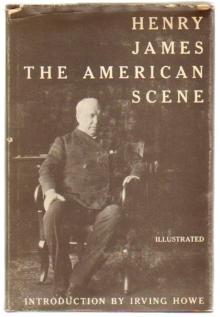 The American
The American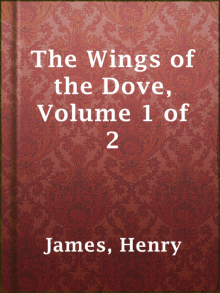 The Wings of the Dove, Volume 1 of 2
The Wings of the Dove, Volume 1 of 2 Frost at Midnight
Frost at Midnight Morning Frost
Morning Frost The Portrait of a Lady — Volume 1
The Portrait of a Lady — Volume 1 Fatal Frost
Fatal Frost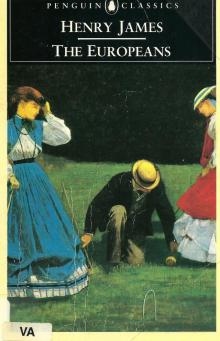 The Europeans
The Europeans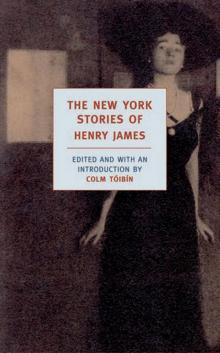 The New York Stories of Henry James
The New York Stories of Henry James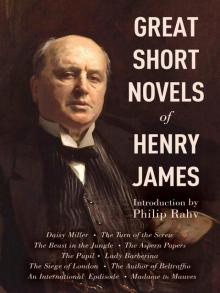 Great Short Novels of Henry James
Great Short Novels of Henry James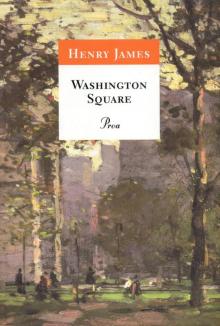 Washington Square
Washington Square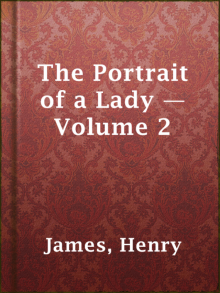 The Portrait of a Lady — Volume 2
The Portrait of a Lady — Volume 2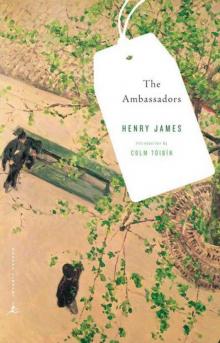 The Ambassadors
The Ambassadors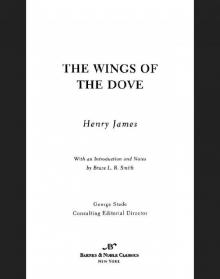 The Wings of the Dove
The Wings of the Dove The Princess Casamassima (Classics)
The Princess Casamassima (Classics) The Coxon Fund
The Coxon Fund First Frost
First Frost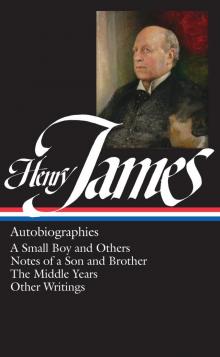 Henry James
Henry James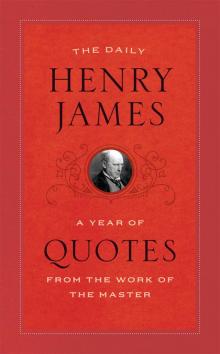 The Daily Henry James
The Daily Henry James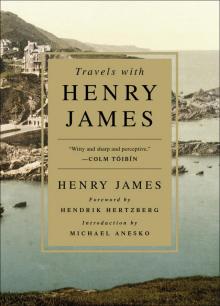 Travels With Henry James
Travels With Henry James The Reverberator: A Novel
The Reverberator: A Novel What Maisie Knew (Henry James Collection)
What Maisie Knew (Henry James Collection)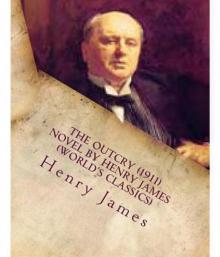 The Outcry
The Outcry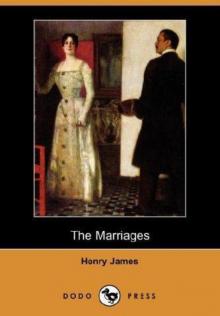 The Marriages
The Marriages The Wings of the Dove, Volume 2
The Wings of the Dove, Volume 2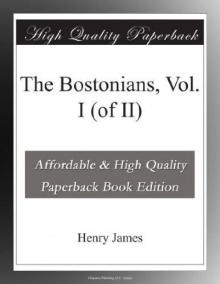 The Bostonians, Vol. I
The Bostonians, Vol. I The Outcry: -1911
The Outcry: -1911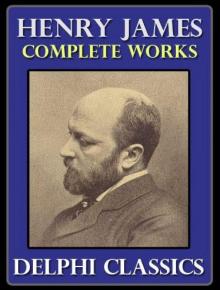 The Complete Works of Henry James
The Complete Works of Henry James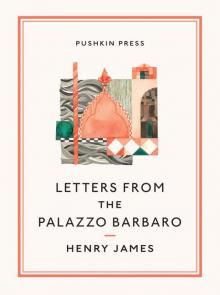 Letters from the Palazzo Barbaro
Letters from the Palazzo Barbaro The Pupil
The Pupil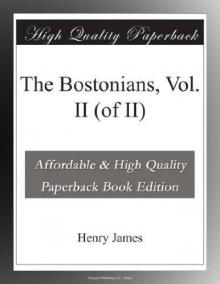 The Bostonians, Vol. II
The Bostonians, Vol. II Pandora
Pandora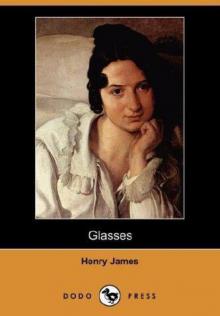 Glasses
Glasses The Princess Casamassima
The Princess Casamassima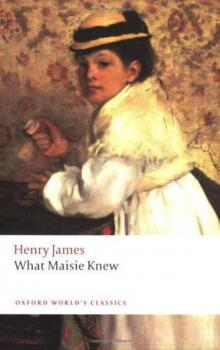 What Maisie Knew
What Maisie Knew The Reverberator
The Reverberator The Golden Bowl - Complete
The Golden Bowl - Complete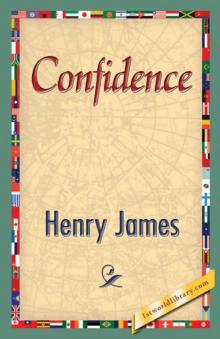 Confidence
Confidence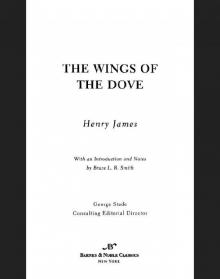 Wings of the Dove (Barnes & Noble Classics Series)
Wings of the Dove (Barnes & Noble Classics Series) The Spoils of Poynton
The Spoils of Poynton